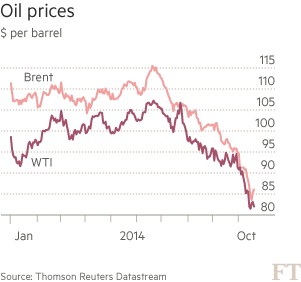In response to what has been discussed on the network forum regarding the reasons for the fall in oil price, it is worth mentioning some important determinants of the price of this commodity.
Firstly, the majority of oil trading takes place through the use of Futures or Forward contracts. The price of these contracts are set or influenced by a number of factors such as interest rates parity, purchasing power parity and the most important of all is the change in expectation of the future spot price. If we consider the period from when the oil price began to rise, the trading of such contracts as well as other derivatives in the financial market have risen in volume extensively, thus, as Krugman puts it, generates an artificial shortfall over a long term. This would be reflected by large stockpiles of crude oil thereby creating an additional physical demand, leading to a price hike in the past. Nowadays, the stability of interest rates and purchasing power as well as the past demand/supply experience has influenced these contract prices through changes to investor perception of future oil spot price. This in turn has led to the recent adjustment in prices.
Secondly, the boom in oil prices has coincided with the expansion in the US money supply, to the extent that the American economic activity cannot absorb the additional money supply. Therefore, in order to neutralise the effect of monetary expansion of the value of the dollar, vis-à-vis major currency. The increase in oil prices was a blessing since oil is priced and paid for in dollars thus creating a demand for dollars to finance the purchase of oil by other nations. As such, the oil has become an American export commodity which will, in effect, prop up the dollar value.
Thirdly, oil is always being used as a political instrument by international players. This has been facilitated by a number of oil producers being influenced by America. The generic relationship between the US administration and the major players in the financial markets, through the ownership structure of the Federal Reserve, enables the US Government to manipulate the level of trade and price of any commodity according to its political aim.
We can conclude that price fluctuation will continue to be the norm in the oil market. In addition, oil producing nations (OPEC in particular) have little or no influence on prices given the current non-unified attitude. Governments who set their revenue expectation of the short term oil price levels will have a problem in meeting their expenditure commitments sooner or later.
What is required is to shelter the economy by promoting other sectors using oil revenue for investment. In other words using oil revenue to get rid of oil influence.
(*) Iraqi Academics and Macroeconomist based in London








Comment here